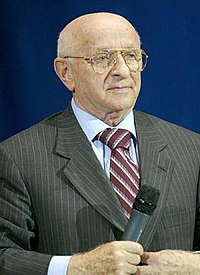Alexander Gomelsky
Alexander Yakovlevich Gomelsky (Russian: Гомельский, Александр Яковлевич; 18 January 1928 – 16 August 2005) was a Soviet and Russian professional basketball coach of Jewish origin.[1] The father of Soviet and Russian basketball, he was inducted into the Naismith Memorial Basketball Hall of Fame in 1995 and the FIBA Hall of Fame in 2007.
Alexander Gomelsky was awarded the Olympic Order by the International Olympic Committee in 1998. In 2008, he was named one of the 50 Greatest EuroLeague Contributors.
Coaching career
Gomelsky began his coaching career in 1948, in Leningrad, with LGS Spartak. In 1953, he became the coach of ASK Riga, leading the team to three Soviet Union League titles, and three consecutive European Champions Cups (EuroLeague), from 1958 to 1960.
In 1966, he was appointed the head coach of CSKA Moscow, where he coached until 1988, leading the club to 16 Soviet Union national league championships (1969-1974, 1976–1984, 1988), 3 Soviet Union Cups (1972, 1973, 1982), and one European Champions Cup (EuroLeague) title in 1971. He also led the club to two more European Champions Cup (EuroLeague) finals, in 1970, and 1973.
He also coached in Spain and France.
Soviet Union national team
Gomelsky coached the senior Soviet Union national team for almost 30 years, leading them to 7 EuroBasket titles (1961, 1963, 1965, 1967, 1969, 1979, and 1981), 2 FIBA World Cup titles (1967, and 1982), and the Summer Olympic Games gold medal in 1988.
He was originally the Soviet national team head coach in 1972, and was expected to coach the team at the 1972 Summer Olympic games, but the KGB confiscated his passport, fearing that, since Gomelsky was Jewish, that he would defect to Israel.[2] The Soviet team, with Vladimir Kondrashin as their coach, won their first Olympic gold medal that year, in a controversial game against the United States national basketball team.
Awards
For merits in the development of sports and basketball was awarded:
- Order of the Red Banner of Labor
- Order of the Red Star
- Order of Friendship of Peoples
- 2 Orders of the Badge of Honour
- Order of Merit (Ukraine) (2003)
- Silver Olympic Order
Career achievements
Club competitions
- EuroLeague: 4 (ASK Riga: 1958, 1959, 1960 & CSKA Moscow: 1971)
- Soviet League: 19 (ASK Riga: 1955, 1957, 1958 & CSKA Moscow: 1969-1974, 1976-1984, 1988)
- Soviet Cup: 3 (CSKA Moscow: 1972, 1973, 1982)
National team competitions
- EuroBasket 1961:
 Gold
Gold - 1963 FIBA World Championship:
 Bronze
Bronze - EuroBasket 1963:
 Gold
Gold - 1964 Summer Olympics:
 Silver
Silver - EuroBasket 1965:
 Gold
Gold - 1967 FIBA World Championship:
 Gold
Gold - EuroBasket 1967:
 Gold
Gold - 1968 Summer Olympics:
 Bronze
Bronze - EuroBasket 1969:
 Gold
Gold - 1970 FIBA World Championship:
 Bronze
Bronze - EuroBasket 1977:
 Silver
Silver - 1978 FIBA World Championship:
 Silver
Silver - EuroBasket 1979:
 Gold
Gold - 1980 Summer Olympics:
 Bronze
Bronze - EuroBasket 1981:
 Gold
Gold - 1982 FIBA World Championship:
 Gold
Gold - EuroBasket 1983:
 Bronze
Bronze - EuroBasket 1987:
 Silver
Silver - 1988 Summer Olympics:
 Gold
Gold
Post coaching career

In his later years, Gomelsky was the president of CSKA Moscow. In 1995, he was inducted into the Naismith Memorial Basketball Hall of Fame. In 2007, he was enshrined into the FIBA Hall of Fame. In 2008, he was named one of the 50 Greatest EuroLeague Contributors.
The EuroLeague's annual Alexander Gomelsky EuroLeague Coach of the Year award is named after him, and so is Alexander Gomelsky Universal Sports Hall CSKA.[3]
See also
- FIBA Basketball World Cup winning head coaches
- List of select Jewish coaches
- List of FIBA EuroBasket winning coaches
- List of EuroLeague-winning head coaches
Bibliography
- A. Ya. Gomelsky (1985). Team Management in Basketball (in Russian). Moscow: Fizkultura i sport. Archived from the original on 24 February 2007. Retrieved 28 March 2007.
{{cite book}}: Unknown parameter|dead-url=ignored (|url-status=suggested) (help)
References
- ^ YIVO | Sport: Jews in Sport in the USSR Archived 29 April 2015 at the Wayback Machine. Yivoencyclopedia.org. Retrieved on 31 October 2016.
- ^ Aleksandr "Sascha" Gomelsky. Jewishsports.net. Retrieved on 31 October 2016.
- ^ Professional Basketball Club CSKA Moscow. Cskabasket.com. Retrieved on 31 October 2016.
External links
- Alexander Gomelsky at acb.com
- Alexander Gomelsky at halloffame.fiba.com
- 1928 births
- 2005 deaths
- ASK Riga coaches
- Deaths from cancer in Russia
- Deaths from leukemia
- Euroleague-winning coaches
- FIBA EuroBasket-winning coaches
- FIBA Hall of Fame inductees
- Jewish men's basketball players
- Naismith Memorial Basketball Hall of Fame inductees
- PBC CSKA Moscow coaches
- Russian basketball coaches
- Russian Jews
- Soviet basketball coaches
- Soviet Jews
- Sportspeople from Saint Petersburg

